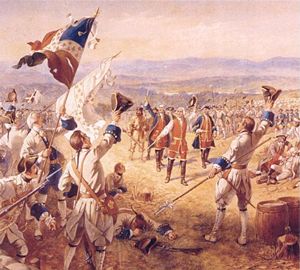| |
Date |
Event(s) |
| 1 | 1746 | - 16 Apr 1746—16 Apr 1746: Battle of Culloden - last battle fought in Britain - 5,000 Highlanders routed by
the Duke of Cumberland and 9,000 loyalists Scots - Young Pretender Charles flees to
Continent, ending Jacobite hopes forever - the wearing of the kilt prohibited
|
| 2 | 1747 | - 1747—1747: Abolition of Heritable Jurisdictions in Scotland
- 1747—1747: Act for Pacification of the Highlands
|
| 3 | 1749 | - 27 Apr 1749—27 Apr 1749: First performance of Handel's Music for the Royal Fireworks (in Green Park,
London)
|
| 4 | 1750 | - Feb 1750—Feb 1750: Series of earthquakes in London and the Home Counties cause panic with
predictions of an apocalypse (Feb/Mar)
- 16 Nov 1750—16 Nov 1750: Original Westminster Bridge opened (replaced in 1862 due to subsidence)
|
| 5 | 1751 | - Mar 1751—Mar 1751: Chesterfield's Calendar Act passed - royal assent to the bill was given on 22
May 1751 - decision to adopt Gregorian Calendar in 1752: In and throughout all his
|
| 6 | 1752 | - 1752—1752: Benjamin Franklin invents the lightning conductor
- 1 Jan 1752—1 Jan 1752: Beginning of the year 1752 [Scotland had adopted January as the start of the year
in 1600, and some other countries in Europe had adopted the Gregorian calendar as early as
1582]
- 3 Sep 1752—3 Sep 1752: Julian Calendar dropped and Gregorian Calendar adopted in England and
Scotland, making this Sep 14
|
| 7 | 1753 | - 1753—1753: Private collection of Sir Hans Sloane forms the basis of the British Museum
- 1 May 1753—1 May 1753: Publication of ?Species Plantarum' by Linnaeus and the formal start date of plant
taxonomy
|
| 8 | 1754 | - 1754—1754: Hardwicke Act (1753): Banns to be called, and Printed Marriage Register forms to be
used - Quakers & Jews exempt
- 1754—1754: In the General Election, the Cow Inn at Haslemere, Surrey caused a national scandal by
subdividing the freehold to create eight votes instead of one
- 1754—1754: First British troops not belonging to the East India Company despatched to India
- 1754—1763:
 The French and Indian War The French and Indian War
|
| 9 | 1755 | - 1755—1755: Publication of Dictionary of the English Language' by Dr Samuel Johnson
- 1755—1755: Period of canal construction began in Britain (till 1827)
- 2 Dec 1755—2 Dec 1755: Second Eddystone Lighthouse destroyed by fire
|
| 10 | 1756 | - 15 May 1756—15 May 1756: The Seven Years War with France (Pitt's trade war) begins
- Jun 1756—Jun 1756: Black Hole of Calcutta - 146 Britons imprisoned, most die according to British
sources
|
| 11 | 1757 | - 1757—1757: The foundation laid for the Empire of India
- 14 Mar 1757—14 Mar 1757: Admiral Byng shot at Portsmouth for failing to relieve Minorca
- 23 Jun 1757—23 Jun 1757: The Nawab of Bengal tries to expel the British, but is defeated at the battle of
Plassey (Palashi, June 23) - the East India Company forces are led by Robert Clive
|
| 12 | 1758 | - 1758—1758: India stops being merely a commercial venture - England begins dominating it
politically - The East India Company retains its monopoly although it ceased to trade
|
| 13 | 1759 | - 1759—1759: Wesley builds 356 Methodist chapels
- 15 Jan 1759—15 Jan 1759: British Museum opens to the public in London
- 16 Oct 1759—16 Oct 1759: Third Eddystone Lighthouse (John Smeaton's) completed
|
| 14 | 1760 | - 1760—1760: Carron Iron Works in operation in Scotland
- 5 May 1760—5 May 1760: First use of hangman's drop
- 25 Oct 1760—25 Oct 1760: George II dies - George III Hanover, his grandson, becomes king. The date conventionally marks the start of the so-called first Industrial Revolution'
|
| 15 | 1761 | - 16 Jan 1761—16 Jan 1761: British capture Pondicherry, India from the French
|
| 16 | 1762 | - 1762—1762: Cigars introduced into Britain from Cuba
|
| 17 | 1763 | - 1763—1763: Treaty of Paris - gives back to France everything Pitt fought to obtain - (Newfoundland
[fishing], Guadaloupe and Martininque [sugar], Dakar [gum]) - but English displaces French
as the international language
|
| 18 | 1764 | - 1764—1764: Lloyd's Register of shipping first prepared
- 1764—1764: Practice of numbering houses introduced to London
- 1764—1764: James Hargeaves invents the Spinning Jenny (but destroyed 1768)
- 1764—1764: Mozart produces his first symphony at age eight
|
| 19 | 1765 | - 1765—1765: The potato becomes the most popular food in Europe
- 22 Mar 1765—22 Mar 1765: Stamp Act passed - imposed a tax on publications and legal documents in the
American colonies (repealed the following year)
|
| 20 | 1766 | - 1766—1766: Start of 'composite' national records on rainfall in the UK
- 5 Dec 1766—5 Dec 1766: Christie's auction house founded in London by James Christie
|
| 21 | 1767 | - 1767—1767: Newcomen's steam pumping engine perfected by James Watt
|
| 22 | 1768 | - 9 Jan 1768—9 Jan 1768: Philip Astley starts his circus in London
- 6 Dec 1768—6 Dec 1768: The first edition of the Encyclopaedia Britannica' published in Edinburgh by
William Smellie
|



 Submit Photo / Document
Submit Photo / Document
